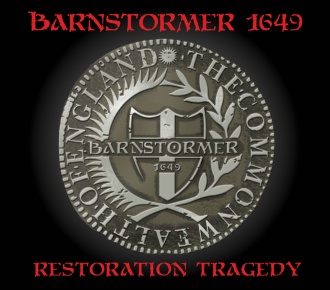This is the last article you can read this month
You can read more article this month
You can read more articles this month
Sorry your limit is up for this month
Reset on:
Please help support the Morning Star by subscribing here
TOO few of us, no doubt, have ever asked ourselves: “What would a punk-crossover-Tudor madrigal sound like?” But John Baine, aka stand-up poet Attila the Stockbroker, has not only had that thought, he’s made the excellent album Restoration Tragedy about England’s 17th century revolution based on his answer.

From the opening The Levellers Trilogy, Baine and his band, Barnstormer 1649, prove that this admixture of radical 17th century history, traditional folk instrumentation and composition and punk sensibilities really can work.
That opening is comprised of a terrific newly written but traditional-sounding instrumental The March of the Levellers, the actually traditional 17th century Diggers Song and a version of Leon Rosselson’s classic The World Turned Upside Down. It’s a great starter and the album fizzes on from there.
The jaunty Wellingborough and Wigan is a tribute to the Diggers, reminding us that it wasn’t just on St Georges Hill in Surrey that Gerrard Winstanley inspired communities that attempted to claim back common land for utopian communities in 1649.
Abiezer Coppe was author of the brilliantly named pamphlet A Fiery Flying Roll, subtitled “a last warning” to “the Great Ones of the Earth.” He was one of the most prominent of the Ranters, a small but extraordinary group of iconoclastic libertarians that emerged in the wake of the revolution.
Coppe believed that God could be found at the bottom of a tankard and that a tavern was as good a place of worship as a church. Ranters were also pioneers of sexual liberation and, for that matter, sexual excess, at least by the standards of the age — and possibly any age.
Baine’s praise is heartfelt and laugh-out-loud funny, particularly its opening lines.
“Now I have been a Ranter for nearly forty years
I’ve done over three thousand gigs and drunk a lot of beers
Sometimes I have ranted and then partied till I drop
But I’m a total lightweight next to Abiezer Coppe.”
The Ranters might be obvious heroes for Baine and the same could be said of Thomas Rainsborough, the Leveller spokesman at the Putney Debates, celebrated here in The Voice.
But Baine has the historical good sense to cast his gaze more widely as well. The chant-like Harrison is a great track celebrating Colonel Thomas Harrison, executed as a regicide at the Restoration, “hung, drawn and quartered by a foe he thrashed in war” as Baine has it. Prides Purge makes the bold move of connecting the clearing out of moderate Parliamentarian MPs in 1648 by the New Model Army’s Colonel Pride with contemporary battles for the deselection of right-wing Labour MPs.
There’s a nice place found for some local history as well. Baine was brought up and still lives in the port of Southwick, yards from where Charles II escaped to the continent after the battle of Worcester in 1651. Two tracks, the military beat of The Monarch’s Way and The Fisherman’s Tale, give an alternative take to the usual celebration of this event as an admirable act of cavalier derring-do.
But although Baine certainly has a way with words, some of the best moments on the album are instrumental. He and his band have mastered an impressive array of 17th century instruments and the cornamuse (bagpipe), shawm (a kind of oboe), rauschpfeife (woodwind) and bombarde (a bass woodwind) are deployed to great effect creating an audio impression of The Battle of Worcester, the final battle of the English Civil Wars.
The haunting Burford Requiem is an equally powerful instrumental tribute to the Leveller mutineers shot in the Cotswold town by Cromwell.
There are some contemporary political parallels here, like the parable about Jeremy Corbyn in The Man with the Beard but what I like most was the care that went into the history. Like the only comparable composition, the Rev Hammer’s song cycle about the life of Leveller leader John Lilburne, Freeborn John, you won’t make many mistakes trusting the history as told in song here.
And that’s important. The English revolution is largely absent from school history and state celebration in Britain. This most powerful episode in the “island story” is often carried irregularly and intermittently, outside the channels of official communication, not least by the left and the labour movement.
This is a musically inventive, funny and moving, accurate and engaging, contribution to that tradition. It celebrates without distorting the acts of our revolutionary predecessors.
Restoration Tragedy by Barnstormer 1649 (Roundhead Records) is available at attilathestockbroker.com








